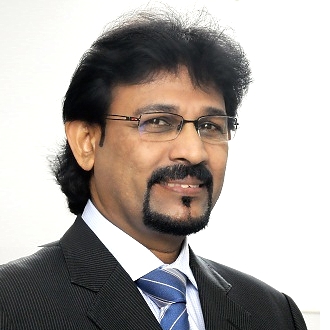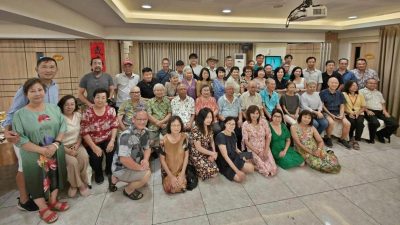
By Ravindran Raman Kutty
On the auspicious day of Aidil Adha, it was shocking to read the glaring reports of a former prime minister being charged for massive corruption, and another about a group of politicians switching political affiliations (leap frogging from one party to another).
My daughter, a final year university student, asked me: What is the message we are sending to the young people of our country today?
Dumbfounded, I had no immediate answer.
Could I say that this will change, or that we are used to this, or that we are going through a difficult phase in politics and conveniently avoid the question?
Perhaps I should tell her the truth?
I think the truth is that we have forgotten or ignored the essence of values in political leadership.
Politics have been tainted by most of the politicians with ill-gotten rewards and awards, forgetting the basic requirements of good governance.
In the pursuit of wealth, every mainstream politician has become rich or has used politics to become rich. Even a guy who used to be waste worker (nothing wrong with being a waste worker) has a few houses and lives a comfortable life because he is a branch chairman of a political party.
He is certainly an inspiration for the others who see him daily.
In Malaysia, most of the ruling political party leaders and the associated branch leaders are rich by any standard, as they get to taste the best of what is to be shared with the ordinary masses.
It can be a low-cost home, temporary occupational land (TOL), a local authority's council appointment or even position with the GLC. Pretty sure, we all saw the new GLC's postings by the new government.
Politics is a big business today. If you jump from one party to another, you can gain up to 24 million.
This is strange, but true in Malaysia. A politician's parliamentary or state seat is really lucrative. Having such a seat is like monopolizing the share market — you can buy or sell according to your whim and still remain in power.
The recent Sabah case was a classic one. A politician, just acquitted of several charges, comes back with vengeance to take over the state. He almost succeeds by striking deals with the local politicians.
Thankfully, the incumbent chief minister managed to get the consent of the state governor to hold a state election. This act saved several millions of the taxpayers' money being squandered or leaked to the wrong source.
Values are the guiding principles in our lives. Leadership is centered around core values. Leaders guide and facilitate others to make a positive difference in their own lives and contribute to a larger good.
Values are the essence of leadership qualities as the competencies of leadership are activated – learned, developed, and practiced – within the set of core values.
By focusing on what people believe and value, and then positively building on this understanding, we have the potential of far more wide-reaching impact programs rather than mere problem-solving activities.
1. Respect
In order to gain the respect of others, leaders must first respect others regardless of their differences; treat those around them with dignity, empathy and compassion. Only then can he/she gain such self-respect.
Leaders must respect the law and the people who voted them to power. Their respect should not end at the ballot box or polling station. Political leaders must exude the powers vested on them to the public, be it the poor or rich, handicapped or experts, single mothers or orphans, young or old, by delivering the goods and administrating good governance without any fear or favor.
Laws must be respected. People must be treated fairly. Then only can such a leader actually be considered a leader.
2. Making a difference
Politicians or political leaders must demonstrate personal efforts that lead to making a positive impact on individuals, systems, and/or organizations.
We need leaders who make a difference in their daily lives. In a financial crisis, we want laws and systems that will ensure the safety and security of every individual from every aspect. During a pandemic, like the current COVID-19 outbreak, we want the country to be equipped with medical care, facilities and professionals to manage the situation, and a nation ready to stand together in overcoming such circumstances.
3. Integrity
Leaders must demonstrate moral courage, ethical strength, and trustworthiness, keeping promises and fulfilling expectations.
Our politicians fail miserably in this area. We see many politicians queuing up for their turn at prisons, courts or police stations, rather than offering services and assistance to those in dire need.
Such conditions include poorly maintained low-cost homes, unfulfilled waste incinerators, Selangor water crisis, high unemployment rate among graduates, increasing numbers of single mothers and people affected by COVID 19, old folks struggling to survive under the current climate, fast-growing number of drug addicts, Mat Rempits and gangsters, and urban poverty issues in our country.
These issues require a corporate leader like Jamsetji Rattan Tata who is highly principled and clear in his vision.
Tata made sure all his employees had living quarters, medical facilities, insurance, Socso scheme, shorter working hours, creche for young mothers, gratuity scheme, humidifiers, fire sprinklers and provident funds, right from the 1880's.
4. Authenticity
Malaysian politicians or leaders must always demonstrate consistency, congruency, and transparency in values, beliefs and actions; integrating values and principles to create a purposeful life and to contribute to the growth of others.
We cannot have a law that imposes a 20-year sentence on a drunk driver, and a 12-year sentence to a corrupt politician who embezzles RM42 million. There must be consistency and transparency among leaders to come out with laws that have a direct impact on the society as well as the image of a country.
5. Courage
Leaders must demonstrate strength of self to act with intention on behalf of the common good; taking a stand in the face of adversity; acting boldly in the service of inclusion and justice. They must stand up for the rights of the minority.
Nelson Mandela challenged the apartheid rule, including spending 27 years in prison for the cause, and won the battle to restore South Africa to what it is.
He took the brunt of suffering in dealing with the issue both internally and externally.
Mahatma Gandhi gained India's independence against the British using non-violence tactics, much to the awe of the British Empire.
Abraham Lincoln stood for racial equality and wiped out slavery.
Malaysia needs a leader of that sort to build a new, yet progressive, liberal and dynamic nation.
6. Service
Leaders must be committed to moving beyond one's own self-interest and showing greater sense of humility for the sake of a greater good.
Throughout the last three years, we have seen more political and corporate leaders going against the law instead of upholding it. Almost every other case involving the corporate or political leaders is corruption or abuse of power for their own vested reasons.
7. Humility
Leaders must possess a sense of humbleness, dignity and an awareness of one's own limitations; yet remain open to perspectives different from one's own.
There is a natural tendency for us to disagree on something, but we must agree to disagree rather than fight over it.
A classic case refers to the Taiwan parliament sessions that are extremely boisterous and bizarre with fistfights among the MP's.
In Malaysia, we have uncouth leaders who still use unparliamentary words when there is a debate on sensitive subjects like the recent "gelap" retort by a parliamentarian to another lady parliamentarian, which is rather racial and discriminatory.
8. Wisdom
"Knowledge comes from learning. Wisdom comes from living." We need leaders to demonstrate broad understanding of human dynamics and an ability to balance the interests of multiple stakeholders when making decisions.
We cannot make statements like the recent purported law on film producers in this current digital age and revert stating that it was not the government's intention following a public outcry.
Wisdom to weigh issues according to current times is vital. 43% of Malaysians are youth. Every decision taken by political leaders must take into cognizance of this fact.
Leaders must have a heart to forgive and care with compassion, yet a head with integrity and responsibility. It's futile to have thousands of successful or unsuccessful world leaders as examples if we do not learn from their experiences or actions.
Political parties must seriously consider conducting leadership programs for their leaders in order to expose them to ambiance, preamble and ground realism of our country.
It's usually the 1% called political leaders who cause all the problems and issues for the 99% of any given country or its people.
History shows that it took only one Hitler to kill 11 million people, one Mao Zedong to kill 40 million people through starvation, one Idi Amin to massacre more than three million people, one Augusto Pinochet to torture 35,000 and several irresponsible Malaysian politicians who have despaired our growth, severed our unity, increased racism, and unbelievable corruption.
We were to be a developed country in 2020. Today, we are literally crawling with wounded limps, worst still after the coronavirus.
We need a change. We need to discard the old hands. We must bring a fresh new wave of leaders who work beyond race, religion and any strata of society.
I am hopeful that things will change for our beautiful nation.
"Hope is being able to see that there is light despite all the darkness." – Desmond Tutu, South African Anglican cleric, anti-apartheid and human rights activist.
(Ravindran Raman Kutty is an active social worker.)
ADVERTISEMENT
ADVERTISEMENT


































